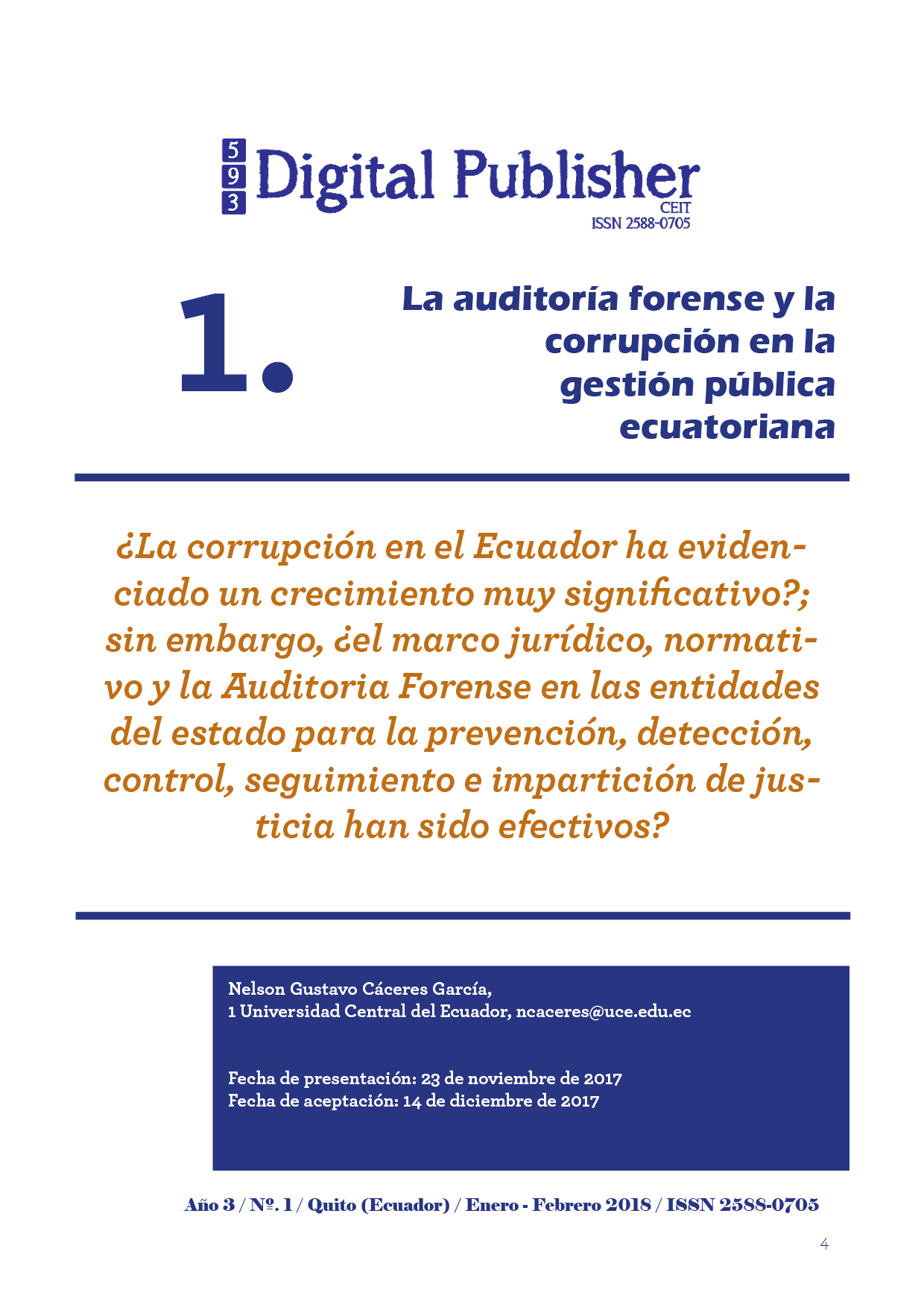La auditoría forense y la corrupción en la gestión pública ecuatoriana
Main Article Content
Abstract
In recent times, forensic audit has reached a significant level of importance, corruption has a main roll in this concern mainly beacuse of the polemic events that took place in ecuadorian society it can be deduced that human behavior, state, public servants, culture, economic development, politic influence, burocracy, among others are shown in this investigation to be an important part in this issue, which affect population ethics and the basis of the nation.
In orther to develop this topic, a research of primary and secondary sources will be realized from scientific articles published at least 15 years ago, priorizing publications that tackle the corruption cases from the past decade and ,in special cases, from past years; therefore, this investigation is sustented in a systemic and bibliographic analisys and has a documental-type aproach, so as to determinate the roll of forensic audit in public managment.
One of the main conclussion from the ongoing study shows that juridistical and regularizing appliance has not reached efective levels, university level education is far from reality concerning social context and ethic values, its clear that the most powerful authorities are involved in a series of political corruption scandals, forensic audit does not invlove in he academic field to tackle the presnt and future social issues, control bodies has identified the critical áreas in order to allow the respective instances to act vigorously to solve this anomalities, against this background the State must adopt tecnical and regularizing correctives in order to make its managment cristal clear.
Downloads
Article Details
1. Derechos de autor
Las obras que se publican en 593 Digital Publisher CEIT están sujetas a los siguientes términos:
1.1. 593 Digital Publisher CEIT, conserva los derechos patrimoniales (copyright) de las obras publicadas, favorece y permite la reutilización de las mismas bajo la licencia Licencia Creative Commons 4.0 de Reconocimiento-NoComercial-CompartirIgual 4.0, por lo cual se pueden copiar, usar, difundir, transmitir y exponer públicamente, siempre que:
1.1.a. Se cite la autoría y fuente original de su publicación (revista, editorial, URL).
1.1.b. No se usen para fines comerciales u onerosos.
1.1.c. Se mencione la existencia y especificaciones de esta licencia de uso.
References
Auditoría en la Administración Pública. (2008).
Bejarano A., J. A. (1997). Corrupción y escandalos políticos.
Berthin, G. (1999). El ser humano, la corrupción y la política. Revista Ciencia y Cultura.
Castro, R., & Cano, M. (2003). Auditoría Forense. REVISTA INTERNACIONAL LEGIS DE CONTABILIDAD & AUDITORÍA.
CEPAT. (2005). AUDITORÍA FORENSE, HERRAMIENTA DE LAS EFS EN LA LUCHA CONTRA LA CORRUPCIÓN. XV ASAMBLEA GENERAL DE LA ORGANIZACIÓN LATINOAMERICANA Y DEL CARIBE DE ENTIDADES FISCALIZADORAS SUPERIORES (OLACEFS), (pág. 2). Obtenido de view.officeapps.live.com
CEPAT. (s.f.). Auditoría Forense, Herramienta delas EFS en la lucha contra la corrupción.
Constituyente, A. (2008). Constitucion de la Republica del Ecuador.
F, D. P. (s.f.). La operación.
Fernández, L. (1999). Psicología de la corrupción y los corruptos. Santiago de Compostela.
García Benítez, C. (2006). Ética de las profesiones.
García, C. (31 de marzo de 2006). Ëtica de las profesiones. Revista de Educación Superior(137). Recuperado el 2017, de www.redalyc.org
García, J. R. (2010). El Auditor Forense. IMCP Contaduría Pública.
Granizo, T. (2017). La Corrupcion es de todos.
Internacional, T. (2016). Ranking Corrupción.
Mendez, E., Figueredo, C., & Catillo Ligia. (2012). Auditoria Forense en America Latina (Casos Colombia ,Venezuela). Dialnet Plus, 26.
Mora, B. Z. (2017). Algunos de los casos mas polémicos. El Universo.
Nacional, Asamblea. (2010). LOSEP. Quito.
Rios Boyan, O. (2014). Auditoría Forense Fraudes Contables y Delitos de Cuello Blanco. Revista Ventana Científica , 61.
Vásquez, R. (2007). Corrupción política y responsabilidad de los servidores públicos. DOXA, Cuadernos de Filosofía del Derecho.
Virgoline, J. (2005). La Razón ausente.
Williams, R. (1999). New concepts for old? Third World Quarterly.

